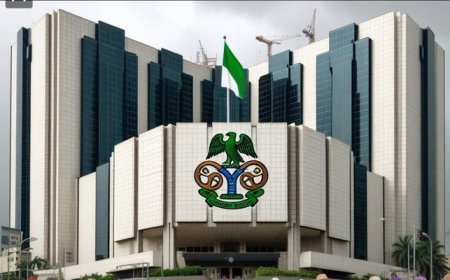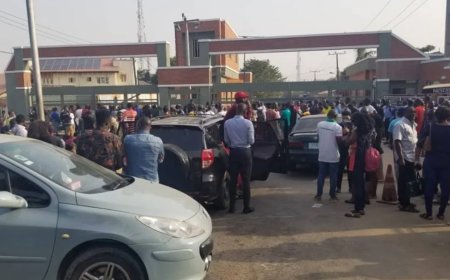Integrity in Business & NPL Reduction in Nigeria | Tinubu’s Renewed Hope
Explore how business integrity can cut bad debts and non-performing loans, advancing President Tinubu’s Renewed Hope Agenda in Nigeria’s financial sector.

In the complex ecosystem of Nigeria's economy, integrity stands as the invisible infrastructure upon which sustainable progress is built. As our nation navigates the challenging waters of economic recovery under President Bola Ahmed Tinubu's Renewed Hope Agenda, the role of integrity-in-business culture, accountability, and trust in our financial interactions has never been more critical. The persistent challenge of non-performing loans (NPLs) and bad debts continues to undermine our collective potential, acting as a silent drag on our financial system's capacity to fuel growth and create prosperity. This opinion piece examines how cultivating a culture of integrity in business transactions can directly impact NPL reduction, strengthen our financial institutions, and ultimately support national development objectives.
The Current State of Non-Performing Loans in Nigeria
Nigeria's journey with non-performing loans reflects our broader economic narrative. After experiencing a sharp rise in NPLs between 2015 and 2017, when rates jumped dramatically from 4.86% to 14.81%, our financial system has shown resilience with NPL ratios gradually declining to 3.9% by 202418. This improvement represents significant progress, placing Nigeria favorably below the global average NPL ratio of 5.5%18. However, this positive trend faces substantial headwinds.
Despite this improvement, financial experts predict potential deterioration in loan performance. Fitch, a prominent credit ratings agency, projects an increase in NPLs in 2024, citing persistent high inflation and escalating interest rates as primary risk factors19. This forecast comes despite data showing that ten leading Nigerian banks maintained an average NPL ratio of 7.49% in the first half of 2024, marginally better than the 7.53% recorded in 202315. This tenuous stability has been achieved despite challenging macroeconomic conditions, including inflation rates reaching 32.7% in September 2024 and the Central Bank of Nigeria (CBN) implementing multiple monetary policy rate hikes, with the most recent adjustment bringing the rate to 27.25%19.
The implications of high NPLs extend beyond bank balance sheets. Research examining NPL trends between 2011 and 2020 revealed a long-run negative relationship between non-performing loans and economic growth in Nigeria14. This finding confirms what many economic analysts have long suspected: when loans fail to perform, the entire economy suffers as credit capacity diminishes and productive investment declines.
The Economic Damage Caused by Dishonesty and Willful Loan Defaulting
The roots of our NPL challenge run deeper than macroeconomic indicators suggest. At its core lies a disturbing pattern of dishonesty and willful loan defaulting that has become normalized in certain business practices and across religious clime. When borrowers deliberately evade repayment obligations, they initiate a destructive cycle that undermines the very foundations of our financial system.
This behavior manifests in multiple ways – from businesses diverting loan funds to unintended purposes, to deliberate concealment of financial difficulties, to outright refusal to honor debt obligations. Particularly troubling is the manipulation of religious and cultural sensitivities as excuses for non-repayment. These practices not only violate fundamental ethical standards but also inflict measurable economic damage.
When NPLs rise, banks must increase loan loss provisions, which directly reduces their capacity to extend new credit. This credit contraction disproportionately affects small businesses and entrepreneurs - the very engines of job creation and economic diversification that President Tinubu's Renewed Hope Agenda seeks to empower. Research has identified that credit growth becomes constrained as banks grapple with managing high NPLs, creating a credit supply bottleneck that stifles economic activity17.

The Importance of Borrower Integrity in Building Sustainable Lending Ecosystems
Sustainable lending ecosystems, whether formal or informal, are built on trust. When borrowers demonstrate integrity by honoring their commitments, they contribute to a virtuous cycle that benefits all stakeholders in the financial landscape.
In formal banking systems, borrower integrity translates to reduced risk premiums, lower monitoring costs, and increased lending appetite. Banks can operate with greater confidence, potentially leading to more competitive interest rates and improved credit terms. For microfinance institutions (MFIs) serving underbanked populations, borrower reliability is even more crucial, as their smaller capital bases leave less room to absorb losses from defaults.
The impact on informal lending networks is equally significant. Community-based lending schemes, cooperatives, and rotating savings groups - which many Nigerians rely on for financial access - function entirely on trust. When members uphold their obligations, these systems thrive as crucial complements to formal financial institutions, extending financial inclusion to communities beyond the reach of traditional banking.
The irony—and indeed the tragedy—is that within this financial ecosystem, a troubling pattern has emerged: a growing number of loan defaulters, who having breached contractual trust, now seek refuge in manipulation and delay tactics. Rather than taking responsibility for their financial obligations, these individuals deliberately employ underqualified or ill-informed legal practitioners. Their aim is not to seek justice, but to use the judicial process as a tool to frustrate and prolong repayment. They file frivolous suits or encourage technical delays in court, all in a bid to defer the inevitable—settling the rightful debts they owe.
This cunning maneuver not only stalls recovery efforts but also breeds a deepening sense of distrust and instability in the lending ecosystem. What is most alarming is that this conduct is increasingly prevalent within religious circles—particularly among the Pentecostal community—where many, cloaked in the garb of piety, exploit their positions of influence and self-righteousness to justify unethical behaviour. They mistakenly equate spiritual fervor with moral superiority and, in doing so, believe they are too anointed or too clever to be held accountable.
Such actions erode the ethical fabric of financial transactions and undermine the foundational principles of trust, integrity, and justice—principles that should be upheld by both the lender and borrower alike. It is high time we called this out for what it is: a misuse of both legal systems and spiritual platforms to shield financial irresponsibility.
The collective impact of individual integrity creates a network effect that strengthens the entire financial ecosystem. Each repaid loan builds institutional confidence, expands lending capacity, and creates opportunities for others to access credit.
How Ethical Repayment Behavior Reduces NPLs and Strengthens Credit Access
The direct correlation between ethical repayment behavior and NPL reduction is undeniable. When borrowers prioritize loan repayment as an ethical obligation rather than a discretionary expense, NPL ratios naturally decline. This relationship creates tangible benefits for Nigeria's financial system and broader economy.
Lower NPL ratios allow banks to reduce loan loss provisions, freeing up capital for new lending. This expanded credit capacity is particularly crucial for financing productive sectors like agriculture, manufacturing, and technology - priority areas identified in President Tinubu's economic diversification strategy16. Moreover, banks with healthier loan books can afford to be more innovative and inclusive in their product offerings, potentially reaching previously underserved market segments.
The Central Bank of Nigeria's studies have identified credit growth, inflation, and lending rates as major drivers of NPLs17. While monetary authorities can address inflation and influence lending rates, the credit growth component depends significantly on borrower behavior. Ethical repayment practices create space for sustainable credit expansion without the corresponding rise in default rates that typically accompanies rapid lending growth.

The Connection Between Financial Trust and National Development
President Tinubu's Renewed Hope Agenda represents a multifaceted approach to economic transformation, with key pillars including economic stabilization, infrastructure development, job creation, and financial inclusion. The integrity of our business practices directly supports these objectives.
The administration has taken bold steps toward economic recovery, including the removal of fuel subsidies to free up resources for critical investments in infrastructure, education, and healthcare16. These difficult but necessary reforms create fiscal space for development, but their full impact depends on efficient resource allocation through a functioning credit system. When businesses honor their financial obligations, they ensure that capital continues to circulate productively through the economy.
The government's efforts to attract foreign direct investment by improving regulatory frameworks and business environments16 are similarly complemented by a culture of integrity. International investors closely monitor NPL ratios as indicators of business ethics and contract enforcement. A declining NPL trend signals that Nigeria offers not just policy improvements but also reliable business partners.
Financial inclusion - bringing more Nigerians into the formal economy - depends heavily on mutual trust. Banks and financial institutions are more willing to extend services to new market segments when they have confidence in repayment behaviors. Each honest transaction builds this confidence incrementally, expanding the frontiers of financial access.
Call to Action: Embracing Integrity as a Tool for National Progress
The path toward reducing NPLs and supporting Nigeria's economic resurgence requires commitment from all stakeholders. Business owners must approach borrowing with honesty and transparency, viewing loan repayment as both a legal obligation and moral imperative. Financial institutions should strengthen risk assessment practices while developing more responsive customer support mechanisms for borrowers facing legitimate difficulties. Policymakers must continue enhancing the regulatory framework while promoting financial literacy and ethical business education.
The choice before us is clear: we can perpetuate a culture where loan defaults are normalized, continuing to undermine our financial system, or we can embrace integrity-in-business as the foundation for sustainable progress. By choosing the latter, we directly support President Tinubu's vision of economic renewal and shared prosperity.
As Nigeria works to position itself as a competitive, diversified economy, remember that national development begins with individual choices. Each loan repaid on schedule, each financial commitment honored, and each transparent business transaction strengthens our collective future. Integrity in business is not merely a moral nicety but a practical necessity for building the Nigeria we aspire to create – a nation where trust fuels growth, opportunity expands, and hope is continually renewed.

Citations:
- https://www.ceicdata.com/en/indicator/nigeria/nonperforming-loans
- https://www.cbn.gov.ng/Out/2021/RSD/Non-Performing%20Loans%20and%20Profitability%20of%20the.pdf
- https://iiardjournals.org/get/IJEFM/VOL.%208%20NO.%208%202023/Commercial%20Bank%20Risk%20147-172.pdf
- https://www.fepbl.com/index.php/ijae/article/view/768/962
- https://www.thecable.ng/understanding-economic-planning-and-tinubus-renewed-hope-agenda/
- https://statehouse.gov.ng/news/fg-to-tackle-poverty-insecurity-with-national-financial-inclusion-agenda/
- https://techcabal.com/2024/03/15/debt-shaming-about-ethical-debt-collection/
- https://firstcentralcreditbureau.com/cbn-targets-loan-defaulters/
- https://techpoint.africa/insight/50-nigerians-informal-loans-expensive/
- https://www.neliti.com/publications/264449/causes-and-measures-for-controlling-loan-default-among-agricultural-cooperatives
- https://businessday.ng/companies/article/non-performing-loans-cross-n1-5trn-despite-improved-loan-quality/
- https://businessday.ng/opinion/article/nigerias-renewed-hope-a-vision-for-2027-and-beyond/
- https://www.mondaq.com/nigeria/privacy-protection/1432816/cyberbullying-by-loan-app-operators-ethical-practices-in-loan-recovery-and-consumer-rights-protection
- https://londonic.uk/js/index.php/ljbeh/article/view/72
- https://www.thisdaylive.com/index.php/2024/11/06/h1-banks-average-npl-ratio-maintains-downward-slide-despite-inflation-interest-rate/
- https://fmino.gov.ng/tinubu-steers-nigerias-economy-towards-recovery/
- https://www.cbn.gov.ng/out/2018/rsd/cbn%20efr%20volume%2055%20no%203%20september%202017%20-%20draft%20for%20upload.pdf
- https://dataphyte.com/latest-reports/is-nigerias-falling-non-performing-loans-a-sign-of-tightening-credit-or-bank-stability/
- https://nairametrics.com/2024/11/04/high-interest-rate-inflation-to-increase-non-performing-loans-of-nigerian-banks-fitch-report/
- https://techpoint.africa/insight/inflation-interest-rates-credit-losses-nigerian-banks-2025/
- https://www.theglobaleconomy.com/Nigeria/nonperforming_loans/
- https://papers.ssrn.com/sol3/papers.cfm?abstract_id=4525497
- https://wjarr.com/sites/default/files/WJARR-2024-0194.pdf
- https://www.spglobal.com/_assets/documents/ratings/research/101592100.pdf
- https://dataphyte.substack.com/p/is-nigerias-falling-non-performing-loans-a-sign-of-tightening-credit-or-bank-stability
- https://datatopics.worldbank.org/debt/ids/country/nga
- https://proshare.co/articles/bank-npls-2-the-banking-industry-and-its-npl-position?menu=Business&classification=Read&category=Debtors+%26+Recovery
- https://www.cbn.gov.ng/Out/2024/CCD/PERSONAL%20STATEMENTS%20OF%20MPC%20MEMBERS%20SEPTEMBER%202024%20MEETING%20AND%20COMMUNIQUE%20(1).pdf
- https://www.ceicdata.com/en/indicator/nigeria/non-performing-loans-ratio
- https://dataphyte.com/latest-reports/extractive/%E2%82%A61-4-trillion-credit-sales-how-nnpcs-history-of-bad-debts-contributes-to-nigerias-revenue-crisis/
- https://iiardjournals.org/get/IJBFR/VOL.%208%20NO.%204%202022/Central%20Bank%20of%20Nigeria.pdf
- https://statehouse.gov.ng/news/52769/
- https://finance.gov.ng/fg-world-bank-unite-to-digitally-empower-young-nigerians-and-drive-job-creation/
- https://neusroom.com/nigerias-renewed-hope-a-vision-for-2027-and-beyond/
- https://x.com/FMINONigeria/status/1920217488458944835
- https://von.gov.ng/nigerian-government-reveals-roadmap-on-job-creation/
- https://x.com/RenewedHopeUK/status/1912175632727130573
- https://www.instagram.com/people_kratos/p/DHtKrZbIQ6l/
- https://nde.gov.ng
- https://x.com/RenewedHopeUK/status/1917720122858385839
- https://nde.gov.ng/5-ways-banks-can-embrace-tech-transformation/
- https://apc.com.ng/img/apc_renewed_hope.pdf
- https://leep.gov.ng
- https://goodwoodpub.com/index.php/ijfam/article/download/827/268
- https://nairametrics.com/2022/01/29/cbn-to-watchlist-recalcitrant-loan-defaulters-through-the-gsi/
- https://scholarworks.waldenu.edu/cgi/viewcontent.cgi?article=13139&context=dissertations
- https://academicjournals.org/article/article1379609203_Onoja%20and%20Emodi.pdf
- https://assets.kpmg.com/content/dam/kpmg/ng/pdf/tax/december-tat-newsletter.pdf
- https://frontierfintech.substack.com/p/f-squared-episode-2-beyond-banking
- https://www.linkedin.com/pulse/central-bank-nigeria-public-officer-garnishee-proceedings-oliver-azi-07hof
- https://sc.edu/study/colleges_schools/moore/documents/finance/berger/the-effects-of-cultural-values-on-bank-failures-around-the-world_cfic.pdf
- https://ng.andersen.com/discretionary-powers-of-tax-authorities-and-some-key-considerations-in-the-nigeria-tax-bill/
- https://poverty-action.org/sites/default/files/publications/Deep-Dive-Report-on-Womens-Access-to-and-Use-of-Credit-in-Nigeria_Gender-Centre-of-Excellence-RPA.pdf
- https://pwcnigeria.typepad.com/tax_matters_nigeria/2021/06/tat-reinforces-statute-of-limitation-rules-that-tax-authority-cannot-carry-out-repetitive-tax-audits.html
- https://www.womensworldbanking.org/insights/report-empowering-nigerias-women-micro-entrepreneurs-actionable-insights-for-financial-services-providers/
- https://worldview.stratfor.com/situation-report/nigeria-budget-plans-foresee-rising-borrowing-and-debt-servicing-costs-2025-27
- https://papers.ssrn.com/sol3/papers.cfm?abstract_id=5019004
- https://theconversation.com/nigerias-2025-budget-has-major-flaws-and-wont-ease-economic-burden-250713
- https://www.tiktok.com/@rohrsteam/video/7389420152552557854
- https://www.youtube.com/watch?v=qKaOF5Xw5wY
- https://www.ifc.org/content/dam/ifc/doc/2024/nigerian-credit-infrastructure-reform-snapshot-of-progress-and-next-steps.pdf
- https://sajems.org/index.php/sajems/article/download/3326/1885
- https://bfjournal.eksu.edu.ng/wp-content/uploads/2023/07/loan-default.pdf
- https://www.consumerfinance.gov/about-us/blog/its-illegal-penalize-borrowers-being-religious/
- https://www.dmo.gov.ng/publications/other-publications/borrowing-guidelines/3174-revised-external-and-domestic-borrowing-guidelines-for-the-federal-government-state-governments-fct-and-their-agencies-2020/file
- https://www.stears.co/article/the-nigerian-consumer-credit-corporation-credicorp-could-unlock-nigerias-informal-lending-market-potential/
- https://zapjournals.com/Journals/index.php/ijare/article/view/2114
- https://en.wikipedia.org/wiki/Usury
- https://www.cbn.gov.ng/supervision/crms.html
- https://papers.ssrn.com/sol3/Delivery.cfm/SSRN_ID3315109_code2153158.pdf?abstractid=3315109&mirid=1
- https://core.ac.uk/download/pdf/236407615.pdf
- https://news.mobar.org/faith-under-stress-troubled-church-loans-in-missouri/
- https://von.gov.ng/minils-dg-applauds-tinubus-renewed-hope-initiative/
- https://statehouse.gov.ng/news/our-renewed-hope-agenda-repositioning-nigeria-as-global-investment-hub-vp-shettima/
- https://msmeafricaonline.com/call-for-applications-fg-nde-renewed-hope-job-creation-program-2024/
- https://punchng.com/tinubu-steering-economy-towards-recovery-says-minister/
- https://fccpc.gov.ng/enforcement-against-digital-lending-violations/
- https://academicjournals.org/journal/AJAR/article-full-text/5BF515263711
- https://papers.ssrn.com/sol3/Delivery.cfm/5189061.pdf?abstractid=5189061&mirid=1
- https://www.ajol.info/index.php/arebusj/article/download/283034/266644/662067
- https://journalsajsse.com/index.php/SAJSSE/article/view/650
- https://dataphyte.com/latest-reports/is-nigerias-falling-non-performing-loans-a-sign-of-tightening-credit-or-bank-stability/
- https://bhlss.wordpress.com/wp-content/uploads/2017/02/2-impact-of-npl-on-profitability.pdf
- https://proshare.co/articles/nigerian-banking-sector-recovery-still-hampered-by-bad-loans?menu=Economy&classification=Read&category=Opinions+and+Analysis
- https://erl.scholasticahq.com/article/123839-navigating-economic-policy-uncertainty-in-nigeria-the-influence-of-soaring-food-and-commodity-prices-on-the-cost-of-living-crisis-in-nigeria-amid-geo
- https://con.londonic.uk/wp-content/uploads/2023/07/The-Impact-of-Non-performing-Loans-on-Nigerian-Economic-Growth.pdf
- https://uk.practicallaw.thomsonreuters.com/4-524-5665?transitionType=Default&contextData=%28sc.Default%29
- https://www.thelawyer-network.com/documents/whitepapers/pdf/fB_3_b7J2.pdf
- https://blog.lendsqr.com/legal-compliance-pitfalls-lenders-must-avoid-in-nigeria/
- https://www.linkedin.com/pulse/overview-money-lending-laws-nigeria-resolution-law-firm-as3cf
- https://pavestoneslegal.com/unsecured-lending-in-nigeria-ways-to-protect-against-default/
- https://indypendent.org/2018/06/my-religion-forbids-me-from-paying-off-my-student-loans/
Kindly share this story:
Contact: report@probitasreport.com
Stay informed and ahead of the curve! Follow The ProbitasReport Online News Report on WhatsApp for real-time updates, breaking news, and exclusive content especially when it comes to integrity in business and financial fraud reporting. Don't miss any headline – and follow ProbitasReport on social media platforms @probitasreport
[©2025 ProbitasReport - All Rights Reserved. Reproduction or redistribution requires explicit permission.]
What's Your Reaction?




































































































